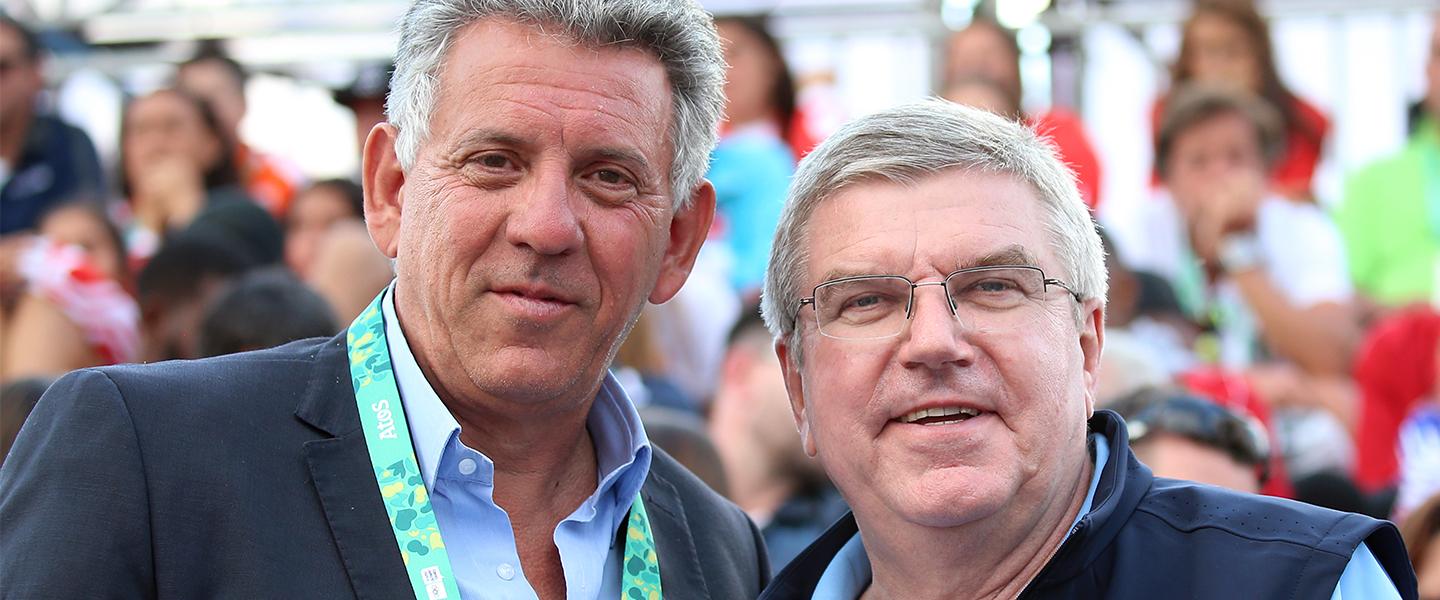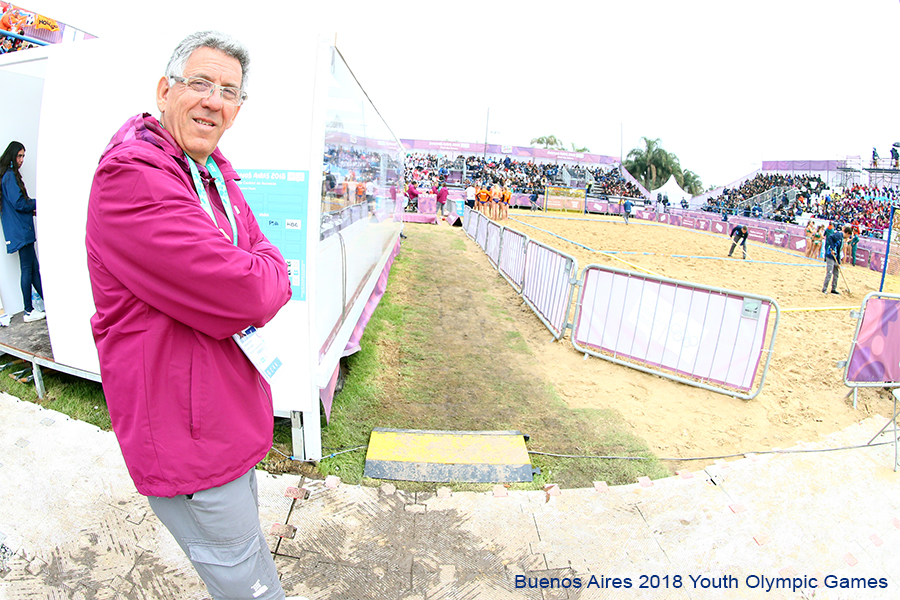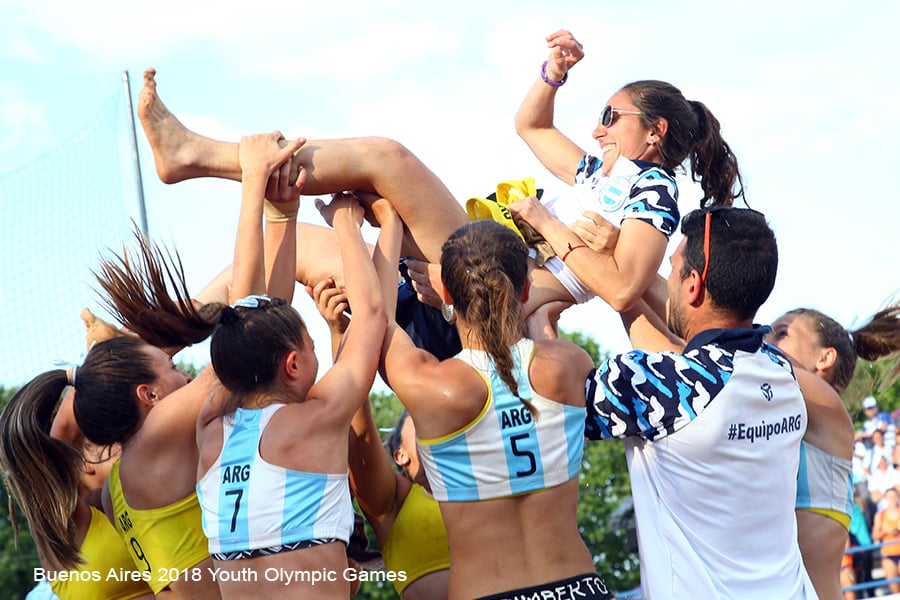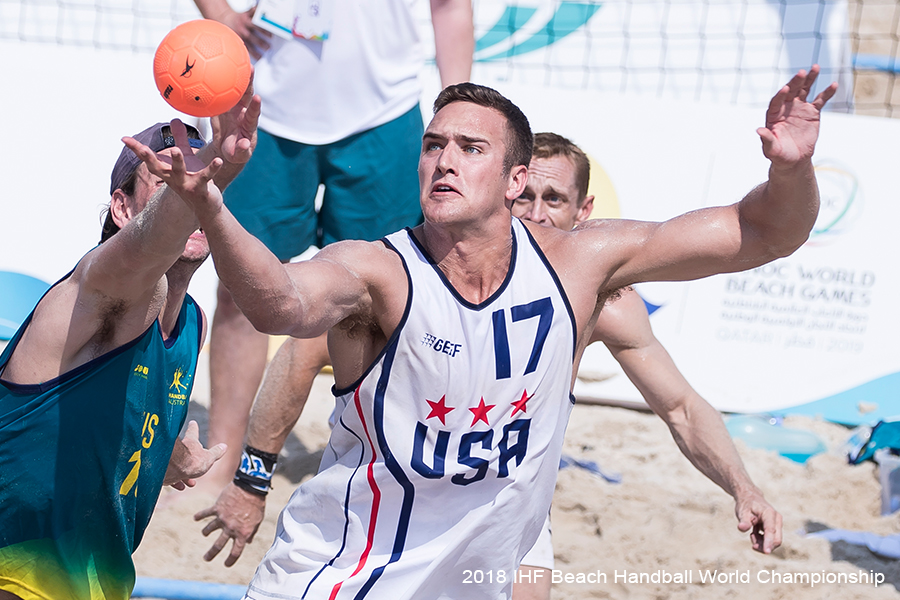Giampiero Masi: “Growth is at the core of our sport”
14 Jul. 2021

One of the key protagonists in global beach handball is Chairman of the IHF Beach Handball Working Group Giampiero Masi, who sat down with ihf.info to talk about his experience of the sport.
ihf.info: Tell us about your involvement with the origins of beach handball?
Giampiero Masi: Everything started in 1992 with the feeling to have a sport to cover the summer period and to widen the borders of handball. With some other colleagues I created the ‘Rules of the Game’ and beach handball the sport was born.
One year later, came the first real experience of beach handball in Italy, on the island of Ponza. It was so appreciated that beach handball became part of the activity of the Italian national (indoor) teams who used it to prepare for their season.
ihf.info: What do you enjoy about beach handball?
Giampiero Masi: It's a summer sport and it's unique. It's so attractive that I can easily say it's the most attractive summer sport among every sport. I enjoy everything about beach handball. I have been deeply connected with beach handball for almost 30 years now and the only thing that changes is the way I perceive things within it.
For example, I’m amazed with the new generation coming through. The ‘2000 Generation’. The young men and women who played at our first appearance at the Youth Olympic Games in Buenos Aires in 2018.
They are growing up on the sand and it was spectacular to see and enjoy their creative contribution to our development as a sport as a whole.
People speak about ‘Generation Z’, ‘Generation Alpha’ and ‘Generation Beta’, but for me, it is clear that all those generations are and will be beach handball generations.
ihf.info: You are Chairman of the Beach Handball Working Group – what is its purpose and aims?
Giampiero Masi: When we speak about purpose, it was necessary to create one IHF official body that will be dedicated to leading the development of beach handball worldwide, so the working group was created back in 2007 following a decision from the IHF Executive Board.
As chair of the Working Group, my role is to represent and manage it and am the bridge between the Working Group and the various other IHF boards. With the four members – my colleagues – I have to define the strategy and take care of the differences amongst our member continents.
That’s something important and sometimes not really and correctly perceived by Continental and National Federations; not everything can be adapted in each continent in the same way, so my role – and of the Working Group itself – is to find the best for all of them.
Our aims are to be global and – something which all of us see as one of the main objectives – to be on the official programme of sport at the Olympic Games.
All the members of the working group were chosen as leading experts in their respective beach handball fields. It's not a Commission, the members are not elected. I’m nominated and it was a decision from IHF President Dr Hassan Moustafa. I want to thank him for the trust he has had in me since 2007 and it all means we can work together with a greater dynamism, counting on the assistance of a dedicated IHF Office.

ihf.info: Tell us briefly about what each member of the Beach Handball Working Group brings to it?
Giampiero Masi: Panos Antoniou (CYP) has been a member since the beginning and is an expert dedicated to officiating. He brings a lot of real knowledge and experience to our delegates and referees and we are constantly exchanging new ideas about possible rule changes.
Fernando Posada (ESP) is our expert on coaching and has also been with me since the beginning. He organises with other colleagues coaching courses in every part of the world and at our championships he works very intensively, analysing the entire competition from the technical side.
It is hard to say ‘former’ coach as in beach handball once a coach you are always a coach, but Burak Tezcan (TUR) has the responsibility relating to promotion and marketing. At every championship he is also responsible for the show/centre court sport presentation. He is also a lecturer and is nominated to share his experience with new coaches around the world.
Another ‘former’ coach, but still always coaching is Sasa Kuburovic (SRB). He is our expert on court design and all related issues. The main contact person with the different local organising committees about the venues in which our competitions will be played. He is so dedicated to beach handball and we care constantly receiving new ideas and strategies from him; he has a lot of different ideas and it enrichens us all. He also lectures around the world like Burak.
While not a member of the working group, Hristo Boskoski (MKD), also known as ‘Taki’, is responsible for beach handball in the IHF Office and without him it would be impossible to carry out many of our activities. He is an integral part of our group and is always ready to collaborate.
Last but not least I also need to mention two other people who are really important in their contribution to the development of our sport, George Bebetsos (GRE) and Alex Gehrer (GER). Both gave their high experience for several years before being replaced by Sasa and Burak.
ihf.info: What is the current state of conversations with the International Olympic Committee (IOC) regarding introducing the sport into the full Olympics? Is the next opportunity 2028?
Giampiero Masi: I think that economic crisis in the last couple of years has made everyone more careful and sensitive to the changes and additional expenses, and beach handball was no different, so we were not able to showcase it in the best possible way.
However, this question gives me the opportunity to inform all those who love beach handball something that can mitigate the sensations experienced when it was revealed late last year that our sport would not be included in the Paris 2024 Olympic Games sports programme.
The relationship between the IHF, the IOC and the Organising Committee of the Paris 2024 Olympic Games has never been interrupted following that decision, in fact, it is on the contrary; it has continued in a stronger, tighter way.
On Monday 5 July, I met the Sports Director of Paris 2024, Jean-Philippe Gatien, in Paris as we are currently negotiating beach Handball to be present during the Paris 2024 Olympic Games – not with a competition, but as a demonstration sport with an invitational tournament featuring the strongest national teams in the world.
All the technical details and various options have been discussed and now the final decision will be made at the Tokyo 2020 Olympic Games between President Moustafa and the President of Paris 2024 Tony Estanguet.
This clearly marks a key step on the way to showcasing our sport to the world and becoming part of the Olympic Games sports programme and we are in close cooperation with all relevant stakeholders working very hard in order to bring back beach handball to the fast lane of development and to become full members of Olympic family by Los Angeles 2028.
ihf.info: How have beach handball rules adapted and changed over the years and how are they decided?
Giampiero Masi: When we are speaking about rules, even from the very beginning the Rules of the Game were made in such a way to satisfy mostly our community and let beach handball be interesting, so, during the years and even decades, there were just minor changes.
However, day by day, we are listening to the opinion of our players, coaches and all people that love beach handball in order to realise changes or make small adjustments in order to make the sport even more attractive and interesting.
At the moment, we are proposing some changes to the IHF and I think soon, we will have some new rules and new clarifications.
ihf.info: What are the elements of beach handball which make it a truly global sport?
Giampiero Masi: Beach handball is a style of life and it’s played with the same elements worldwide. I believe that young people are extremely interested in open air, modern sport, played on sand.
Beach handball is dynamic, attractive and thrilling. Who can ask for more? Do you like fair play? Well, it’s deeply involved in our philosophy.
If you prefer that even beginners can compete against those who are experienced, or those with less technical or tactical skills can compete with those who have more, or those who are shorter against taller and slower against faster, then beach handball shows everything is possible.
Due to the cleverly-created rules there is not any team sport in the world which can offer all of these opportunities to players. It is a real open sport for open minded people.
But let’s not forget to mention one quality that we are all proud of: gender equality. This has been, and is, one of our core values as a sport. Always, our women’s and men’s competitions are held in tandem, at the same time and at the same venues and officiated by mixed gender referees and delegates.
All of our participants are equal and we are especially proud about the fact that beside our players, our female coaches have won many trophies with the gold medal won by Leticia Brunati and her Argentina women’s side on home sand at the 2018 Youth Olympic Games in Buenos Aires a clear recent highlight in this respect.

ihf.info: Why is it important that the IHF offers beach handball as another discipline of handball?
Giampiero Masi: Handball is a traditional sport which has its respective position in the global sports market. However, consumers and habits change rapidly and it is very important that we have beach handball as a platform which can help us to keep attention and generate additional interest, especially among young people that are key demographic for overall growth for the whole of handball.
ihf.info: How can beach handball help make handball more inclusive with people and countries across the world?
Giampiero Masi: Further to previous comments, beach handball and 7-a-side handball have amazing synergic power. When we started with beach handball most of the players were handball players that started playing something new during the summer break.
Later on, as beach handball became recognised as an attractive sport, we saw a lot of new players make their first steps on sand and not on the 40mx20m court.
In some countries, we are in situation where basic participation in beach handball matches and events has created interest to play in the so-called ‘indoor’ version.
It is a two-way street now and depending on the climate, availability of indoor or beach courts, tradition, resources or other factors, we have ‘indoor’ and beach handball helping each other in development – and helping grow handball overall.
But don’t forget, beach handball doesn't need a lot of equipment like indoor handball. All you need is a goal and a ball. That's the basics. If you want to train you also don't need a sports hall as well.
One example of this is American Samoa in the Pacific Islands. Five years ago, we visited there to help train them and it has been really successful. They improved so much they won the Oceania Continent Handball Federation qualification event and were given the right to compete in the 2018 Youth Olympic Games.
This same concept is valid for other ‘small’ countries or those with less of a ‘tradition’ of handball. And while success in beach handball can always be possible, in ‘indoor’ it’s maybe only a dream.
ihf.info: Where do you see the future progression of beach handball in the near future?
Giampiero Masi: Beach handball is unstoppable. Today, more than 120 countries are practicing beach handball globally and I have to say I am very happy with the development over the past 10 years. Of course, if we become part of the Olympic Games programme then everything will boost automatically and we have the power to do this – there will be more countries and players dedicated to the sport.
We never had any doubts that we would have a high rate of growth, that we would have new and highly-interesting competitions or have a lot of new players and teams, but within the next five years probably, and for sure within 10 years, we will reach 100%, or close to it, of our IHF Member Federations to have national teams in beach handball.
Of course, we are planning on longer growth period, but, firstly, we are concentrating on the next year, 2022.
After the long pause due to COVID-19, 2022 will bring us back to organising the IHF Men’s and Women’s Beach Handball World Championships at both U17 and senior level and we can finally start our new competition: the IHF Beach Handball Global Tour.
As always, we will keep working on development and support to emerging countries.
ihf.info: How strong is beach handball across the IHF continents? Where is it strongest? Where is weakest? Where is it growing the most?
Giampiero Masi: We used to be modest when we speaking about the development of beach handball across continents. We are one of just a few sports with such a spread of quality across the world.
So far, we have organised eight World Championships in four different continents, but that was just the start – we now have IHF Beach Handball World Championship title-winners from three different continents with medallists from four.
Teams from Europe and South and Central America are leading for sure, in particular, the Brazilians, who are by far the most successful.
But we are also seeing a new wave of talented teams coming from other continents and are looking forward to seeing their continued growth. We can look towards Asia where several National Federations are working really hard to develop it and from the USA where I see a brilliant future.

Long-term, we have to concentrate on Africa. Senegal will host the next Youth Olympic Games in 2026 and it will provide the best possible opportunity to develop beach handball in the continent.
I will give you two interesting examples which highlight beach handball’s global presence. At the 2017 World Games in Poland, the women’s final was between two non-European teams (Brazil and Argentina), while in the men’s competition three continents won medals with Brazil, Croatia and Qatar winning gold, silver and bronze, respectively. So, unlike ‘indoor’ handball, Europe is not in focus as it is usually.
2022 will also be exciting as beach handball will be part of the 2022 World Games in Birmingham, USA. After the 2019 ANOC World Beach Games were moved from San Diego to Doha, Qatar, this is a great opportunity to ‘discover America’ and, I am quite sure, we will have some new proof of the spread of beach handball’s top quality.
ihf.info: How important is it that beach handball has so many younger age categories?
Giampiero Masi: As a sport or discipline, we are quite new on the world stage. We started with IHF Men’s and Women’s Beach Handball World Championships in 2004 and with no events in 2020 or 2021 so far, it has been just 15 years up between that and the last large-scale global beach handball event – the 2019 ANOC World Beach Games held in Doha, Qatar.
Once beach handball was confirmed as part of the 2018 Youth Olympic Games, we created the IHF Men’s and Women’s U17 Beach Handball World Championships as part of the qualification process and I’m convinced that year by year we will give more opportunities to the younger generations to compete on the global level.
Don’t forget: children and youth are our future. We can’t develop a sport without younger age categories. We have to spread competitions for younger age categories globally and we have to work hard for that, which we are doing.
ihf.info: How important is it that education and coaching not only for players, but for coaches, delegates, referees, administrators is at the core of the sport?
Giampiero Masi: The heart of the game will always be the players, but they need coaches to reach their goals and without them it’s not possible to develop our sport. And we need the referees and the delegates as well, only altogether can we have a real top product.
It’s a big circle. Without one of these actors it’s hard to create a sustainable development. It’s our main task to educate and to assist all of them. If you want to develop any activity, you need to let people learn and improve their personal capacities. Then, by positive feedback you will get additional value in your sport. We care most about our players and coaches, but the only way to grow, in the way we want and we do, is to let the entire structure of beach handball have the possibility to be better tomorrow than today.
Each member of our beach handball community helps development by their personal improvement and that growth is the core of our sport.
ihf.info: In your opinion and personal experience, what has been the biggest change in beach handball since you started working in it?
Giampiero Masi: We made a lot of very important steps through our development so far, but as I said before, we all want to see beach handball in the sport programme of the Olympic Games and our competition at the 2018 Youth Olympic Games was a true milestone. That was the start on the path to our inclusion in making it to the biggest sporting stage and I well remember that everything connected with our participation in 2018 was remarkable.
Before concluding his interview, Giampiero Masi had one final thing to say to ihf.info…
Giampiero Masi: I would like to address a prayer for all those who have been affected by coronavirus and who have had someone taken away from them.
One of them I will miss in particular, Jànos Gròz. It will be difficult for me to enter a Beach Handball court and not see his kind-hearted ‘warrior’ look but I’m sure he is looking at us from above. R.I.P. Jànos.

